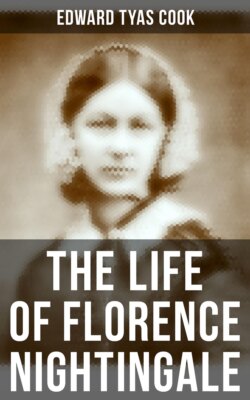Читать книгу The Life of Florence Nightingale - Edward Tyas Cook - Страница 44
На сайте Литреса книга снята с продажи.
IV
ОглавлениеHappy as Miss Nightingale was at Kaiserswerth, there was yet one thing lacking. She wished, it is true, for no other earth; she had found her pictured heaven; her life was full and rich. Yet with all her self-reliance, and even in the moment of first victory in her long struggle for self-expression, she yearned, woman-like, for sympathy. Nay, and not only woman-like. “Not till we can think,” said Carlyle, “that here and there one is thinking of us, one is loving us, does this waste earth become a peopled garden.” It was not enough to Florence that she should have had her way and that her parents should have acquiesced. Her loving heart craved for their positive sympathy; her mind, half leaning for all its masterfulness, demanded that what she had decided should be accepted by those dear to her as their choice also. “I should be as happy here,” she wrote to her mother (August 31), “as the day is long, if I could hope that I had your smile, your blessing, your sympathy upon it; without which I cannot be quite happy. My beloved people, I cannot bear to grieve you. Life and everything in it that charms you, you would sacrifice for me; but unknown to you is my thirst, unseen by you are waters which would save me. To save me, I know would be to bless yourselves, whose love for me passes the love of women. Oh how shall I show you love and gratitude in return, yet not so perish that you chiefly would mourn! Give me time, give me faith. Trust me, help me. I feel within me that I could gladden your loving hearts which now I wound. Say to me, ‘Follow the dictates of that spirit within thee.’ Oh my beloved people, that spirit shall never lead me to anything unworthy of one who is yours in love.”58 But her mother and her sister, though they loved and admired her, or perhaps from their point of view because they did so, were unable to give any such active sympathy as that for which she craved. Her sister hoped that the visit to Kaiserswerth would be only an episode. It was a good thing, she had written to her mother, for Florence to go there, “as we can get her back sooner to Lea Hurst.” To Florence herself she wrote affectionately, but yet with gentle irony. She sent a lively letter describing in detail the birth of a friend's twins: “I tell you, as you are going to be a sage femme, I suppose.” Mrs. Nightingale, for her part, had acquiesced in the visit to Kaiserswerth, but was already wondering what people would think of her daughter's escapade. “I have not mentioned to any one,” wrote Florence (July 16), “where I am, and should also be very sorry that the old ladies should know. With regard, however, to your fear of what people will say, the people whose opinion you most care about, it has been their earnest wish for years that I should come here. The Bunsens (I know he wishes one of his own daughters would come), the Bracebridges, the Sam Smiths, Lady Inglis, the Sidney Herberts, the Plunketts, all wish it; and I know that others—Lady Byron, Caroline Bathurst, Mr. Tremenheere, Mr. Rich (whose opinions however I have not asked)—would think it a very desirable thing for everybody. … With regard to telling people the fact (afterwards) of my having been here, I can see no difficulty. The Herberts, as you know, even commissioned me to do something for them here. The fact itself will pain none of them.” Mr. and Mrs. Herbert, who were at Homburg, presently paid her a visit at Kaiserswerth.
Mrs. Nightingale and her elder daughter reached Cologne on their way home in October 1851, and there Florence rejoined them. “Our dear child Florence,” wrote the mother to Madame Mohl (October 9), “came to us yesterday, and is gone this morning to visit certain Deaconesses and others. I long to be at home and among our people. Daily and hourly I congratulate myself that our home is where it is. Oh what a land of justice and freedom and all good things it is, compared to what we have seen, and how surprising that with all our advantages and our freedom won we should not be so much better than other people. Well, I hope Florence will be able to apply all the fine things she has been learning, to do a little to make us better. Parthe and I are much too idle to help and too apt to be satisfied with things as they are.”
